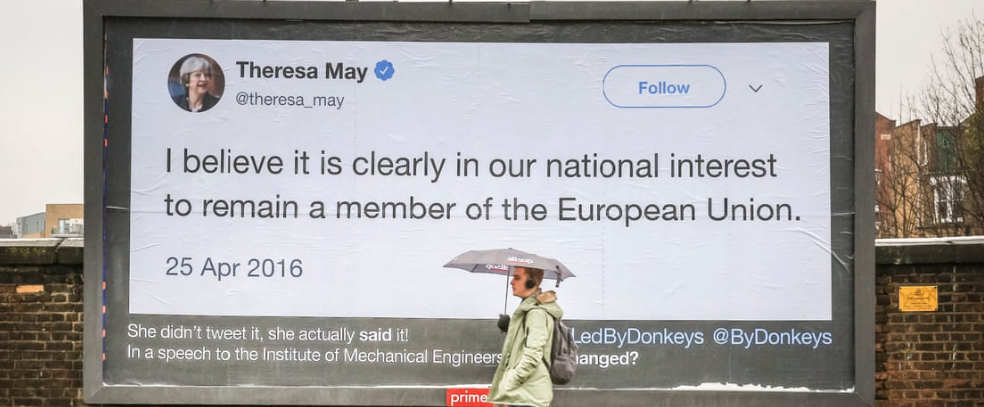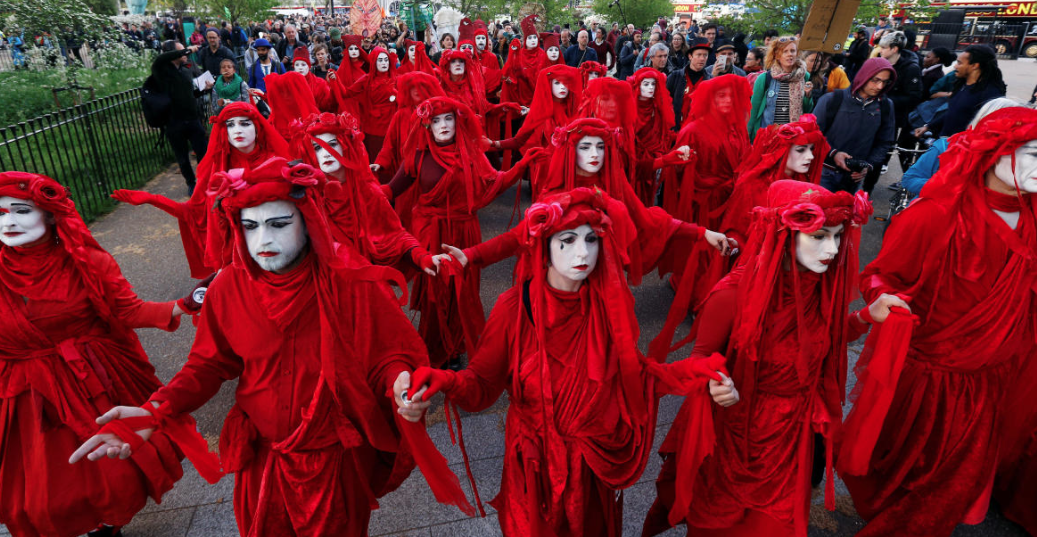Alternative Editorial: We Are At War
Poster courtesy of Led by Donkeys
It’s the end of May at the beginning of June. What is the true significance of that headline appearing all over the world, accompanied by pictures of a tearful Prime Minister who has finally admitted defeat in her battle to deliver Brexit for the UK. And an adjacent picture of Boris Johnson, professional buffoon waiting to take over?
So many competing stories pile up around it. Is this the end of the Conservative party? Is it all over for Britain? Why are the media focused on her tears – is it a gender issue? It’s a thrilling day for those who love a bit of political drama. And even those who don’t, are in thrall.
But we are almost in June. It’s already 6 months since Rebellion Day 1 when Extinction Rebellion managed to break through our media induced trance for a brief moment, to let us know the building – our planet - is on fire.
However, we went back to sleep. It’s six weeks since the second media breakthrough, when XR brought parts of London to a halt. It coincided with a short lull in the Westminster spectacle so was given a fair ride.
Now we are back to our fixation with the 2% – the dominant political discourse, fully backed by the media. The consequences are not small: while we are waiting for Westminster to sort out its act, time is slipping away.
Having been alerted to the ten-year window within which we need to pull of the mother of all socio-economic-political transformations, every month counts. Instead, the richness of the front-page drama – tears and all – seduces and blinds us to the urgency of escaping the burning building. Never before has the urgency to wake up been so relevant.
Poster courtesy of Led By Donkeys
For those who believe there is no alternative, the argument goes that we cannot avoid this battle at the top. Who is in charge at Westminster will define the outcomes for all of us: once ‘our party’ wins, it will all change. These voices cannot see the poverty of the political structure and culture that has failed until now to halt the destruction of our planet, or worse, enabled it.
Watching our mainstream political programmes - Newsnight, Question Time, the Daily Politics - gives us no relief. There is little or no attempt to step outside the failed logic, just an endless energy for getting in amongst the little mini-dramas opening up on a daily basis, each one an emotional minefield. Because the real prize for them is viewing figures.
There is no attempt to stand back and bring clarity to the situation we are in. Or maybe there is no capacity for grasping that Theresa May’s failing is not that she could not bring a successful compromise between the opposing views—but that she cannot see that such a compromise is not available. The falsely constructed conflict ensures mutual destruction.
Let me illustrate. Imagine a leader that had said: “After a year of deliberation it is now clear that what Leave offered obliges us to break the Northern Ireland Peace agreement. We apologise that we didn’t see that before, and apologise to Europe for asking them to ignore that.
“We now need to call a second referendum to give the people a more realistic choice: between No Deal (and all that implies) and Remain”.
Instead May – and her counterparts on the Left – have drowned in the desire to keep a promise the law exposed as impermissible.
One might argue that Nigel Farage does know this. Which is why he is now energetically reframing the Leave vote as a No Deal on WTO terms – something quite different from the original campaign that won the 52% vote.
How many leavers are now confused? Did I want to lose Northern Ireland and possibly Scotland and Wales by voting Leave? Wasn’t this about an extra £200m for the NHS? And making Britain great again?
To avoid that consternation, Farage has now shifted his emotional triggering to the issue of democracy itself. “Your right” to have Brexit delivered (even if his own actions reveal you didn’t know what you were voting on).
Farage, like Trump, Steve Bannon and others who share a broader political agenda are particularly skilled in crafting a political message that harnesses political vulnerability. And they are more ruthless in putting money behind the overwhelm that social media can achieve in bringing those messages home.
There are some signs that others are beginning to see this is as much a soft power as a hard power battle: the fight for the right story that triggers the most reaction. Many of us will have appreciated the subtle work of “Led by Donkeys” that simply calls Farage and the broader Leave campaign out by exposing their contradictions.
Extinction Rebellion have also gone full out for capturing the imagination of the public and “telling the truth” by any means possible. Physically, by stopping the flow of traffic. But also by grappling with what attracts, aesthetically as well as emotionally.
Their battle reminds me of the kids game, Pokemon: each side choosing carefully which ball to throw next, in the battle for capturing the attention of the public.
But how much is this still a zero-sum game that no-one can win? And if so, what is the alternative? For the past two years we have been drawing attention to quite a different possibility for change: long-standing regenerative solutions which are now converging with a new kind of politics, arising in the space between localism and municipalism.
However, the slow and steady nature of this development lies in stark contrast to the rapid, well-funded growth of the counter-revolution spearheaded by Farage and others like him around the world.
Greta Thunberg, School Strike for the Future and Extinction Rebellion did the invaluable job of waking up the media and putting the public on high alert. But as far as we can see, there is little or no follow up plan to move that energy into the kind of concrete action now needed.
Not everyone will or can put themselves on the line the way XR has done till now: history might remember them as a very rare collection of heroes. But far more will be able to do the kind of practical community action we all need – if only they knew what that action is.
Many of those forms of “social making” are already known: so the race is not just to give instructions, but to create the conditions within which those tools are picked up and used. And a big part of that is being able to hold people’s attention long enough to get them to move from intention to action, from single action to habit. Think that sounds easy?
At a recent meeting with senior politicians in attendance, one (whose name I won’t divulge for fear of dispiriting us all), stood and gave a very persuasive speech. “We are in a war” he said. “The battle between good information and bad cannot be underestimated. We are fighting for our very existence”.
After applause, the meeting moved into questions and interventions from the audience, most of which showed an incredible energy to know more and do more. I looked over at the politician repeatedly, hoping for some engagement: never once did I see him look away from the twitter stream on his phone.
The real battle we are in right now, as we face our multiple crises, is for attention. Not simply in the face of a media whose business model is to hijack our emotions at any cost. But in the face of our own distractedness and the constant temptation to look for the thing that gets our more personal needs met.
We aren’t grasping that where we focus our attention is where we are investing our power.
We are always quoting Mary Douglas on how small groups of people are not only capable of making change, but are the only kind of group that ever does. The quote is much more understandable when you think of amount of focus that group can have. They are unlikely to succeed without a clear goal and ways of sticking to that, in the face of the obstacles they will encounter. More than ever, in this present age, fear and distraction will be the tool of choice for any opposition hoping to halt their progress.
But we must also consider whether the goal of our environmental, climate and ecology movements are clear enough to those who have always felt excluded by politics as usual. How can we articulate better a future that not only saves the planet but, in the same breath, transforms our society, giving every human a much better life than before?
Only a narrative that bring together the needs of the I, the We and the World – in ways that excite and attract - has a chance of engaging enough people to make the change we need. At A/UK, this is where we are building it.
Extinction Rebellion




